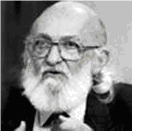Paulo Freire (1921–97) was Brazilian educator whose ideas on the role of education for the poor, proved to be tremendously influential. After training as a lawyer, he decided to become a secondary school teacher, rising to become Director of the Department of Education and Culture in the Brazilian State of Pernambuco. He later worked in various Brazilian universities, developing adult literacy programs. After a military coup in Brazil in 1964, he lived and worked in Chile for five years, then with the World Council of Churches in Geneva, not returning to Brazil until 1980. During his time of exile, he developed his ideas further and published a number of books, the most renowned of which was Pedagogy of the Oppressed (1972).

The truly committed must reject the banking concept in its entirety, adopting instead a concept of [people] as conscious beings, and consciousness as consciousness directed towards the world. They must abandon the educational goal of deposit-making and replace it with the posing of the problems of [people] in their relations with the world. ‘Problem-posing’ education, responding to the essence of consciousness—intentionality—rejects communiqués and embodies communication. It epitomizes the special characteristic of consciousness: being conscious of, not only as intent on objects but as turned in upon itself … as consciousness of consciousness.
Liberating education consists in acts of cognition, not transferrals of information … Problem-posing education, breaking the vertical patterns characteristic of banking education, can fulfil its function of being the practice of freedom … Through dialogue, the teacher-of-the-students and the students of the teacher cease to exist … The teacher is no longer merely the-one-who-teaches, but one who is him [or her]self taught in dialogue with the students, who in their turn while being taught also teach. They become jointly responsible for a process in which all grow …
Banking education … attempts, by mythicizing reality, to conceal certain facts which explain the way [people] exist in the world [such as the facts of power and inequality]; problem-posing education sets itself the task of de-mythologizing. Banking education resists dialogue; problem-posing education regards dialogue as indispensable to the act of cognition which unveils reality. Banking education treats students as objects of assistance; problem-posing education makes them critical thinkers. Banking education inhibits creativity and domesticates (although it may not completely destroy) the intentionality of consciousness by isolating consciousness from the world, thereby denying [people] their ontological and historical vocation of becoming more fully human. Problem-posing education bases itself on creativity and stimulates true reflection and action upon reality, thereby responding to the vocation of [people] as beings who are authentic only when engaged in inquiry and creative transformation … Problem-posing education affirms men as beings in the process of becoming—as unfinished, uncompleted beings in and with a likewise unfinished reality.
Freire, Paulo. 1972. Pedagogy of the Oppressed. Harmonsdworth UK: Penguin. pp. 45–46, 52–53, 56–57. || Amazon || WorldCat
